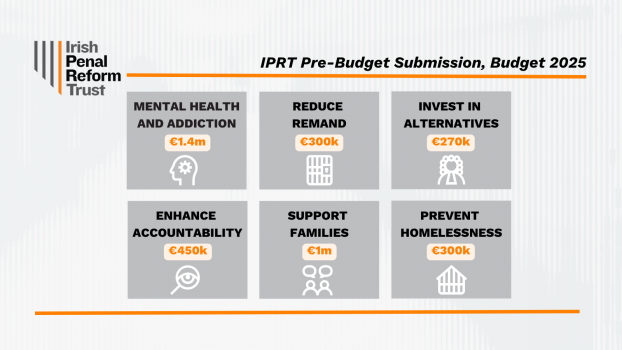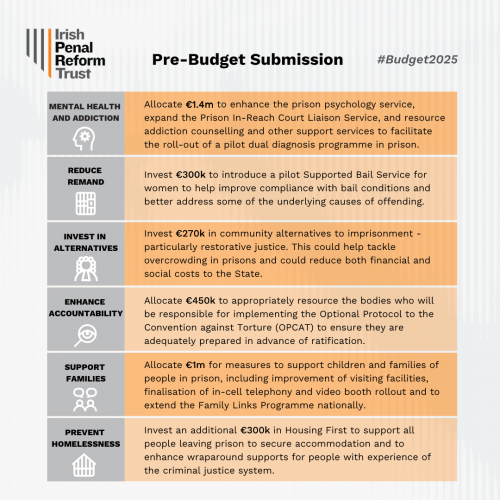IPRT Pre-Budget Submission Budget 2025
4th September 2024
Irish Penal Reform Trust (IPRT) has prepared our pre-Budget submission to legislators for consideration ahead of Budget 2025.
This submission is written against the backdrop of unprecedented prison overcrowding. The highest-ever prison population in the history of the state was recorded in late June 2024, when the number of people in custody surpassed 5,000; this record has been frequently beaten since.
IPRT believes that prison expansion not only contradicts existing government policy, but the lengthy process of prison building will not offer any short-term solution to hundreds of men and women currently sleeping on prison floors and thousands more who are sharing cells. If financial resources and political will are not invested in supporting and championing effective alternatives to prison, the resources needed to continually increase the prison estate will be a financial and social drain on the State for decades to come.
However, while not a long-term solution to the problem, the Irish Prison Service (IPS) should be adequately resourced in the short-term to ensure it can safely staff overcrowded prisons. This is important for everyone living and working in prison. This should include resources to help alleviate current pressures where existing staff are available and willing to work additional hours.
Imprisonment, while necessary in some cases, in many other cases is an ineffective, counterproductive and hugely expensive response to offending. This is particularly the case for people on shorter sentences (less than 12 months) who made up three-quarters of all sentenced committals to prison in 2022. IPRT believes that both short- and long-term savings can be made within discrete areas of the Justice vote by shifting emphasis to cheaper and more effective responses to offending, some of which lie outside of the Justice vote.
Budget 2025 provides an opportunity to invest in practical measures that will help to alleviate chronic prison overcrowding. It also provides an opportunity to invest in key supports to improve the lives of people in prison, people leaving prison, and their families.
IPRT calls for strategic and evidence-based investment under six action areas:

In Budget 2025, IPRT is calling on the Government to invest in:
-
Respond to mental health and addiction – €1.4M
Resource and implement recommendations made by the government-appointed High Level Task Force to consider the mental health and addiction challenges of those who come into contact with the criminal justice sector. This should include enhanced resourcing of the prison psychology service, expansion of the Prison In-Reach Court Liaison Service, and the resourcing of addiction counselling and other support services to facilitate the roll-out of a pilot dual diagnosis programme in prison. -
Reduce remands to custody – €300k
The number of people held on remand (pre-trial detention) in Irish prisons is increasing. This is a costly expense for a population who should be presumed innocent unless proven otherwise. To improve compliance with bail conditions and better address some of the underlying causes of offending, a pilot Supported Bail Service for women should be introduced, with the ultimate aim of rolling this out more widely.
-
Invest in alternatives – €270k
The Irish prison system is facing unprecedented overcrowding. Prison expansion not only contradicts agreed government policy, but it will not offer a short-term solution to the hundreds of men and women sleeping on prison floors. Instead, investment in community alternatives – particularly restorative justice – could reduce both financial and social costs to the State.
-
Enhance accountability – €450k
Ratification of the Optional Protocol to the Convention against Torture (OPCAT) is long overdue. When ratified, it will put in place vital safeguards to ensure that the most vulnerable people in our society are protected. This will benefit all places where people are deprived of their liberty. However, appropriate resourcing of the bodies responsible for implementing OPCAT is required to prepare for ratification.
-
Support children and families – €1M
The recent recruitment of a National Family Connections Officer by the IPS enhances capacity for further reform in this area. This programme of work should include improvement of visiting facilities, the finalisation of in-cell telephony and video booth roll out across the prison estate, and the expansion of the Family Links Programme nationally.
-
Prevent homelessness – €300k
Homelessness and unstable accommodation can obstruct the path to desistence from offending. At a minimum, all people leaving prison should be supported with pre-release planning and accommodation on release. However, further investment in Housing First is needed, including to enhance wraparound social and health supports for people with experience of the criminal justice system.
Read the full IPRT pre-Budget submission for Budget 2025 here or download the document or designed PDF version below.

Documents
Related items:
- Invitation to Tender: Rethinking Remand - Exploring current pre-trial detention practices and examining potential alternatives that protect individuals’ rights and reduce unnecessary detention
- RTÉ: Prison overcrowding 'extremely concerning', says Irish Penal Reform Trust
- Irish Independent: Thousands of Irish prisoners receive no in-person visits from family or friends
- RTÉ Prime Time: Young people who offend
- Life Sentences and Whole Life Orders - IPRT




